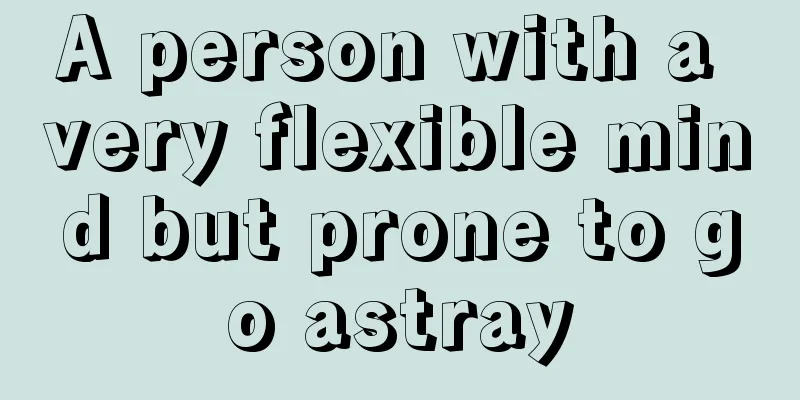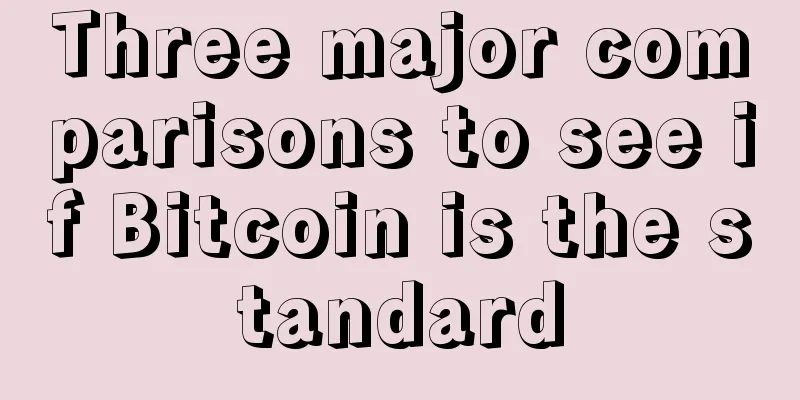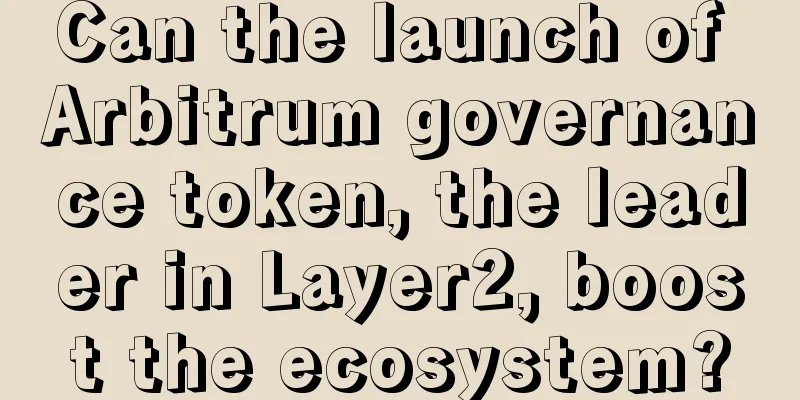Get the whole world with Bitcoin

Chapter 0 IntroductionIn Luoji Siwei's New Year's Eve speech, Luo Pang talked about the operating logic of Alibaba and Tencent. These two great companies are trying to reconstruct the relationship between people and the world. They both use big data to accurately define people and the world. Why do we need big data? Because "no one on the Internet knows that you are a dog", and only through multi-dimensional verification of big data can we confirm whether you are really a dog. When Luo Pang gave his speech, I thought of the value of Bitcoin. The Bitcoin blockchain can confirm identity, and information in this dimension can confirm identity. On January 10, Babbitt's Chang Qia gave a speech in Shenzhen titled "The End of Currency, the Beginning of Credit: Blockchain Introduces the Arrow of Time into Transactions", in which he talked about the theme that Bitcoin can allow people's credit to be transferred across platforms. This article attempts to continue the imagination along the lines of Luo Pang and Chang Jian (it’s ok if you think it’s just a fantasy), and talk about how to reconstruct the relationship between people and the world after the introduction of Bitcoin. Chapter 1 Alibaba and TencentMarx once said: "The essence of man is the sum of all social relations." It's too troublesome to explain what this sentence means, it's something on the philosophical level. We can break it down into three levels. The first is the social relationship with others, such as who are your relatives and friends. We check our Moments every day to constantly check our presence in social relationships, and we can't make ourselves appear irrelevant in these relationships. The second is the relationship with geographical location, such as whether you are in Beijing or Shenzhen. The third level is the relationship between you and material wealth, such as buying a car, ordering a meal, and especially your credit. Alibaba is a company that manages a large amount of material wealth, and then waits for users to come and contact it, and thereby finds the user's social and geographical relationships, thereby unifying these three levels of relationships and obtaining an accurate definition of a person. Tencent, on the other hand, has a good grasp of the user's circle of friends. Tencent knows exactly how many friends you have and how many godfathers you have. It can also accurately track the user's geographic location, thereby accurately guiding the exchange of wealth between users. Alibaba and Tencent are both great companies. Personally, Tencent controls a lot of my information acquisition and interpersonal communication, while Alibaba controls most of my payment behaviors. I also obtained certain authorizations from these two companies. Tencent's Wechat Loan gave me a credit line of 17,000 yuan. JD.com gave me an overdraft line of more than 6,000 yuan. Maybe Ma Huateng thought I was a relatively reliable person. Alibaba gave me a Huabei overdraft line of 5,400 yuan, but it wouldn't let me open a Jiebei account. Compared with Ma Huateng, Jack Ma obviously treats me badly. I guess it's because I'm more handsome, and a handsome guy like Ma Huateng doesn't need to be jealous of me, but Jack Ma is obviously suspected of this. They both rely on big data to mine users' credit. Both companies must master a person's social relationships, and need to master the user's interpersonal network, geographic location information and payment information at the same time. They will actively mine this information and use it to operate their business. It can be said that both Alibaba and Tencent are reconstructing the relationship between people and the world through the Internet. However, they are going in opposite directions: Alibaba sees people more clearly through the world, while Tencent gets the whole world from people. Chapter 2 Users are passiveAlibaba and Tencent will want to mine the sum of users' social relationships, but there are two obstacles in this process. One is that some people don't like to be mined by them and will actively block them to avoid being seen too clearly by them. The other is that some people will forge some social relationships to deceive the business operations of these two companies. Take me for example. I had Alipay in 2006, but at that time I was afraid of those things that asked me for money on the Internet, so I specially got a bank card with no money to bind to Alipay. When I needed to use Alipay, I would temporarily top up. Later I found Alipay too convenient, and began to do a lot of transactions on Alipay, such as transfers and credit card repayments. But at this time I kept a trick. I applied for another Alipay account, which was completely separated from the Taobao account. I didn't want Ali to know too much about me. When I bought things on Taobao, I still used the dead card to trade. In addition, I was often entrusted by people on Taobao to buy things (you know), so I made up some transactions. When I got to the WeChat era, I found it incredible. It was almost impossible to avoid Tencent's tracking. I found that in QQ chats, some words would be underlined, there were links, and one was an advertisement. Damn it, Tencent knew everything I said. So I adopted another strategy and cooperated with Tencent in all aspects. I changed my QQ, WeChat and email to my real name, and moved a lot of payment information to WeChat. You want to see me, right? Then I'll take off all my clothes and let you see enough. The result is obvious. Tencent obviously treats me badly. But I can't cheat Ali. Ali still won't open Jiebei for me, and the credit limit of Huabei is also very low. But my transaction limit on Taobao is much greater than that on JD.com and WeChat. Through my own case, I expressed two pain points for users when reconstructing the relationship between users and the world on the Internet. First, privacy is not protected. Second, identity information is not accurately defined . For example, Alibaba and Tencent define me as two different types of credit, with a huge gap. There are also two pain points for the platform. One is transaction fraud by users. The other is that in order to deal with transaction fraud and information layout, data must be collected in multiple dimensions, which is very costly, which is why only giants can do it. But we all know that being able to accurately define the relationship between ourselves and the world will bring us huge benefits. For example, we can get loans, we can save transaction costs, we can use the sharing economy... So is there a better way to define the relationship between ourselves and the world than Alibaba and Tencent? Well, it’s time for Bitcoin to come on stage. Chapter 3 Using Bitcoin Signatures for AuthenticationRegarding the problem of "no one on the Internet knows that you are a dog", large platforms use big data to conduct multi-dimensional mining of an identity to confirm the identity. For example, WeChat can track your location. If someone steals your WeChat payment and pays at other locations, you can file a complaint based on this. Without big data, it is even difficult for us to confirm our own identities. For example, if I borrow money from a friend through WeChat, how can my friend confirm that it is really me on the other end of WeChat, given that there are so many scammers now? If it is a very familiar friend, it can be confirmed through language and video. But if it is a friend who has not been in touch for a long time, basically no one dares to believe it. The Bitcoin blockchain cannot be copied or forged, and it is the only one that exists on the Internet. As long as you have the private key of an address, you can use the signature method at any time to prove to others that the address belongs to you. Based on this understanding, we should take the initiative to use an address and use it online for a long time, allowing time to deposit your identity on this address. When you need to confirm your identity to them, you can ask them to come up with a sentence, and then you use this sentence to sign your address. This way you can confirm that the owner behind this address is you. The best example is Satoshi Nakamoto. The most difficult identity to forge in the world is Satoshi Nakamoto, the creator of Bitcoin. Neither the CIA nor a certain party can forge Satoshi's identity because Satoshi Nakamoto has the only private key in the genesis block of the Bitcoin blockchain. The genesis block of Bitcoin is a good way. The genesis block of Bitcoin has 50 BTC, and the code is hard-coded, so these 50 BTC cannot be used. The address is here "1A1zP1eP5QGefi2DMPTfTL5SLmv7DivfNa" (some fans donated some coins to this address, and the balance exceeds 50 BTC). But this coin is undoubtedly owned by Satoshi Nakamoto. In other words, Satoshi Nakamoto, the owner of the private key corresponding to this Bitcoin, has no right to use it, but has ownership. So if someone forged Satoshi Nakamoto's speech online, and if Satoshi Nakamoto felt it was necessary, he could use this private key to sign and note that the speech was not made by him. Then the whole world would know the truth. The biggest problem with this authentication method is that the private key may be stolen. The possibility of a private key being stolen is lower than losing your ID card, but it is still possible. So please keep your private key properly, and if your private key is stolen, use a signature to broadcast that your private key is in the hands of a second person other than you. Chapter 4: Building Privacy 2.0 with Bitcoin Public-Private Key PairsNow we can use private key signatures to show our identity to others. What’s more valuable is that this is a technology that can prove your identity in a single dimension. If you forget your Alipay password, when you appeal to retrieve your password, Alipay will ask you to provide some information, such as your ID card, your recent payment transactions, your father's phone number, etc. These are your privacy, and Alipay has the potential to do evil with this information. But the private key signature method does not require you to master these. Because the Bitcoin blockchain is the only one on the Internet and cannot be forged. This is Privacy 2.0. You can confirm that you are you without showing them your identity in multiple dimensions. The problem of proving your mother is your mother finally has a simple solution, a solution that does not require digging up ancestral graves. Chapter 5 Using Bitcoin Coin Day Destruction to Prevent Credit Scams(This paragraph is a topic discussed in Professor Chang Qia’s speech in Shenzhen, “The End of Currency, the Beginning of Credit: Blockchain Introduces the Arrow of Time into Transactions”) Anyone who knows a little about Taobao should know the concept of fake orders, where a Taobao store fakes a large number of transactions to make its store appear popular. Taobao has tried every possible way to solve the problem of fake orders, using big data to determine whether a store is fake orders, but to no avail. Why is it possible to fake orders? Because the currency we use now has no time attribute . That is, the money I pay to a Taobao shop owner can be returned to me by the Taobao shop owner. This back and forth big data cannot determine that the transaction is invalid. However, Bitcoin has an attribute as a currency - What is coin-day destruction? The definition is: the amount received x the number of days retained = coin-days destroyed . Suppose you received 5 coins at an address ten days ago and spent them today, then you contributed 5 times 10 coin-days to destruction. Because the Bitcoin blockchain records your coin-day destruction contribution value, this gives Bitcoin payments a clear and traceable time attribute. In Taobao, if you sell to others with your left hand, your transaction volume will increase. However, if you add the coin-day attribute of Bitcoin, for example, if you use Bitcoin to pay, your transaction volume will increase, but your coin-day will not change, because Bitcoin is not deposited in your fund pool. If the credit of a person's Taobao store refers to the destruction of coin-days, then it is difficult to increase the credit. With such attributes, the platform does not need big data to accurately identify a person's credit. For example, there is a profession now that requires maintaining credit cards, where some people use credit cards to swipe them more often, deceiving the bank into believing in their spending power and repayment ability, thereby increasing their credit card limit. It is because of the current legal currency that when you swipe money from your credit card and return it, big data cannot identify whether you are really spending or cashing out. But if the time attribute is introduced into the legal currency system, the system will track your payment time attribute, whether the cash stays in your savings card or in a merchant's fund pool. The system can determine whether you are really spending or cashing out. (In fact, the credit card system can achieve this function, but banks ignore cashing out because banks are profitable in the cashing out process, and they earn commissions.) Therefore, Bitcoin transactions give a person's payment a time-weighted attribute. The benefit is that the credit is more authentic and reliable, and it is possible to identify whether it is true or not without the need for big data mining. Chapter 6 Using Bitcoin public and private keys as accounts to connect all platformsIn the first chapter, I explained that in order to build the relationship between users and the world, large platforms must use big data mining. However, the definition of social relationships obtained through this mining is controlled by large platforms, not users. An obvious example is why Tencent gives you a higher loan amount than Alibaba? Why are my social relationships more valuable in Tencent, but can only be sold at a low price in Alibaba? Because the relationship I have built with the world is controlled by the platform, I cannot migrate to other platforms, and I cannot take it with me. This is not because the platform is bad or stingy, but because the platform cannot determine the user's real social relationship as long as it leaves the big data it controls. Is there a way for me to take my social connections with me? For example, if I have a crown store on Taobao, can I use it to open a high-credit store on JD.com? Obviously not. This is because the data of Taobao and JD.com are not interoperable, and they have different definitions of my credit. Now let’s use Bitcoin as an example. I use a public and private key pair that can verify my identity to open a store on Taobao. The account is the public key, and the private key is used for authorization when logging in. All transaction records can be recorded on the blockchain. I use the same public and private key pair to log in to WeChat. The public key corresponds to the account, and the password corresponds to the private key. All my social relationships can be traced on the blockchain. I use the same public and private key pair to log in to Didi Taxi. The public key corresponds to the account number, and the password corresponds to the private key. Then my travel and geographical location can be traced by the blockchain. I use the same public and private key pair to log in to JD.com to buy things. The public key corresponds to the account, and the private key is used to authorize the login. Then my payment relationship can also be recorded on the blockchain. … Of course, if you don’t want this public-private key to track certain actions of yours, you can apply for another pair of public-private keys. For example, you can use one private key to date a girlfriend, and use another private key to buy condoms but not use them with this girlfriend. . . … Now, my social relationships can be tracked through my public and private keys using blockchain, my payment relationships can also be recorded by blockchain, and my geographic location can also be tracked by blockchain, so I can prove my relationship with the world to any organization. I have mastered my essence - the sum of all social relationships. Can you believe that owning a public-private key pair is equivalent to owning the big data of all platforms? Moreover, you can actively verify your identity, protect your privacy, and actively authorize. Through Bitcoin, you can get the whole world. This is really priceless. Chapter 7 ConclusionI don’t know if all this is an illusion, it’s really beautiful. If you find the article useful, please give me some Bitcoin to encourage me to continue writing. Author: tan90d (Weibo @LightningHSL WeChat tan90d) |
<<: Bitcoin will not fail, Mike Hearn will fail
>>: How important is it to hold your own coins?
Recommend
[Filecoin Weekly Report-63] The space race begins, a turbulent week!
Co-edited by Steven Li and Iris Project Introduct...
How does ProgPoW resist ASIC? The development team IfDefElse will give you the answer
After receiving some attention from mainstream me...
What does the mole of misery mean?
Today, the editor will show you what is a mole of...
Palmistry of a fickle woman
Palmistry of a fickle woman There is an influence...
Are children of people with wide chins filial?
There is nothing wrong with knowing things about ...
Is it good for a woman to have a cinnabar mole on her chest? What does a cinnabar mole on the chest represent?
Zhang Ailing once said that what is red is a cinn...
The DAO development team is back with a new project, Charity DAO, that focuses on philanthropy
The Slock.it team is making a comeback. Slock.it ...
How to tell a woman's career success from her face
In fact, many women in the new era today will wor...
Judging a person's fortune from moles
Fate is very subtle. Some people are born with go...
What are the facial features that will lead to happiness in a second marriage? What kind of people will marry a second time?
Marriage is a very important thing in people'...
Ripple: Decentralized ledger technology can save banks 42% of payment fees
Ripple has shown that banks using the Ripple netw...
What are the palm lines of women who are born rich?
Although today's society is very developed, pe...
Plutus crowdfunding has raised more than $1 million in 9 days, using mobile phones to pay for Bitcoin and Ethereum through POS terminals
Tap & Pay contactless cryptocurrency payment ...
What to do if pomegranate wood encounters the aspect of husband-killing? How to resolve the aspect of husband-killing
Some women can be said to be talented, beautiful,...
Detailed explanation of the Fortune Palace in the twelve palaces of face reading
The poem says: Mei De Tian Cang Di Ge is round. T...









